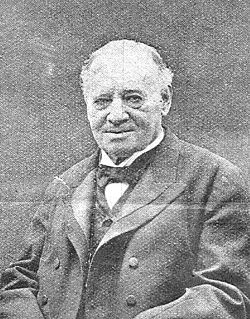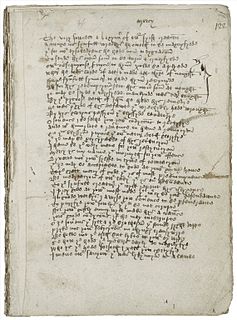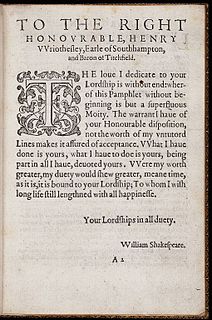Related Research Articles
The Master of the Revels was the holder of a position within the English, and later the British, royal household, heading the "Revels Office" or "Office of the Revels". The Master of the Revels was an executive officer under the Lord Chamberlain. Originally he was responsible for overseeing royal festivities, known as revels, and he later also became responsible for stage censorship, until this function was transferred to the Lord Chamberlain in 1624. However, Henry Herbert, the deputy Master of the Revels and later the Master, continued to perform the function on behalf of the Lord Chamberlain until the English Civil War in 1642, when stage plays were prohibited. The office continued almost until the end of the 18th century, although with rather reduced status.

Textual criticism is a branch of textual scholarship, philology, and of literary criticism that is concerned with the identification of textual variants, or different versions, of either manuscripts or of printed books. Such texts may range in dates from the earliest writing in cuneiform, impressed on clay, for example, to multiple unpublished versions of a 21st-century author's work. Historically, scribes who were paid to copy documents may have been literate, but many were simply copyists, mimicking the shapes of letters without necessarily understanding what they meant. This means that unintentional alterations were common when copying manuscripts by hand. Intentional alterations may have been made as well, for example the censoring of printed work for political, religious or cultural reasons.

Edmond Malone was an Irish Shakespearean scholar and editor of the works of William Shakespeare.
Sir Walter Wilson Greg, known professionally as W. W. Greg, was one of the leading bibliographers and Shakespeare scholars of the 20th century.
The Historical Association is a membership organisation of historians and scholars founded in 1906 and based in London. Its goals are to support "the study and enjoyment of history at all levels by creating an environment that promotes lifelong learning and provides for the evolving needs of people who share an interest in history." The association's patron is Queen Elizabeth II. The Historical Association was incorporated by Royal Charter in 2006, its centenary year. Legally it is a charity registered in England. The plan for a national historical association came from a group school teachers. The formation was handled by university academics, especially Professors Charles Firth, Albert Pollard, and Thomas Tout. At first it dealt chiefly with teaching problems. The membership was expanded to include laymen, and the association branched out into activities such as publication and research in local history.

Christian David Ginsburg was a Polish-born British Bible scholar and a student of the Masoretic tradition in Judaism.

Mankind is an English medieval morality play, written c. 1470. The play is a moral allegory about Mankind, a representative of the human race, and follows his fall into sin and his repentance. Its author is unknown; the manuscript is signed by a monk named Hyngham, believed to have transcribed the play. Mankind is unique among moralities for its surprising juxtaposition of serious theological matters and colloquial dialogue. Along with the morality plays Wisdom and The Castle of Perseverance, Mankind belongs to the collection of the Folger Shakespeare Library in Washington, D.C. as a part of the Macro Manuscript.

Alfred William Pollard, FBA was an English bibliographer, widely credited for bringing a higher level of scholarly rigor to the study of Shakespearean texts.

A text publication society is a learned society which publishes scholarly editions of old works of historical or literary interest, or archival documents. In addition to full texts, a text publication society may publish translations, calendars and indexes.
The Poor Man's Comfort is a Jacobean era stage play, a tragicomedy by Robert Daborne — one of his two extant plays.
Andrew Crooke and William Cooke were London publishers of the mid-17th-century. In partnership and individually, they issued significant texts of English Renaissance drama, most notably of the plays of James Shirley.

The True Tragedy of Richard III is an anonymous Elizabethan history play on the subject of Richard III of England. It has attracted the attention of scholars of English Renaissance drama principally for the question of its relationship with William Shakespeare’s Richard III.
The Soddered Citizen is a Caroline era stage play, a city comedy now attributed to John Clavell. The play was lost for three centuries; the sole surviving manuscript was rediscovered and published in the twentieth century.
Ronald Brunlees McKerrow, FBA was one of the leading bibliographers and Shakespeare scholars of the 20th century.

Q1 of Hamlet is a short early text of the Shakespearean play. The intended publication of the play is entered in the Stationers' Register in 1602 by James Roberts, but Q1 was not published until summer or autumn 1603. It was published by the booksellers Nicholas Ling and John Trundell, and printed by Valentine Simmes. Roberts later printed the "Second Quarto" (Q2).

Thomas James Wise was a bibliophile who collected the Ashley Library, now housed by the British Library, and later became known for the literary forgeries and stolen documents that were resold or authenticated by him.

The spelling of William Shakespeare's name has varied over time. It was not consistently spelled any single way during his lifetime, in manuscript or in printed form. After his death the name was spelled variously by editors of his work, and the spelling was not fixed until well into the 20th century.
The University of Washington Press is an American academic publishing house. The organization is a division of the University of Washington, based in Seattle. Although the division functions autonomously, they have worked to assist the University's efforts in support of the Burke Museum of Natural History and Culture, the Henry M. Jackson School of International Studies, and the Center for Innovation and Research in Graduate Education. Since 1915, they have published the works of first-time writers, including students, poets, and artists, along with authors known throughout the world for their work in the humanities, arts, and sciences.

The Macro Manuscript is a collection of three 15th-century English morality plays, known as the "Macro plays" or "Macro moralities": Mankind, The Castle of Perseverance, and Wisdom. So named for its 18th-century owner Reverend Cox Macro (1683–1767), the manuscript contains the earliest complete examples of English morality plays. A stage plan attached to The Castle of Perseverance is also the earliest known staging diagram in England. The manuscript is the only source for The Castle of Perseverance and Mankind and the only complete source for Wisdom. The Macro Manuscript is a part of the collection at the Folger Shakespeare Library in Washington, D.C.. For centuries, scholars have studied the Macro Manuscript for insights into medieval drama. As Clifford Davidson writes in Visualizing the Moral Life, "in spite of the fact that the plays in the manuscript are neither written by a single scribe nor even attributed to a single date, they collectively provide our most important source for understanding the fifteenth century English morality play."
The Cambridge Shakespeare is a long-running series of critical editions of William Shakespeare's works published by Cambridge University Press. The name encompasses three distinct series: The Cambridge Shakespeare (1863–1866), The New Shakespeare (1921–1969), and The New Cambridge Shakespeare (1984–).
References
- 1 2 3 4 About the Malone Society n.d.
- 1 2 3 Ashley 2014, pp. 317–318.